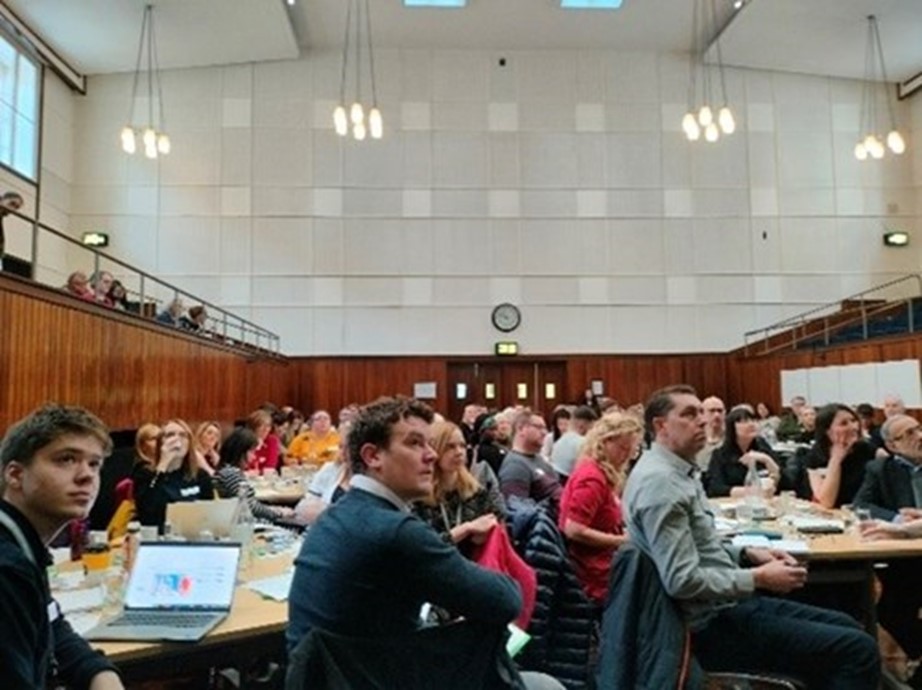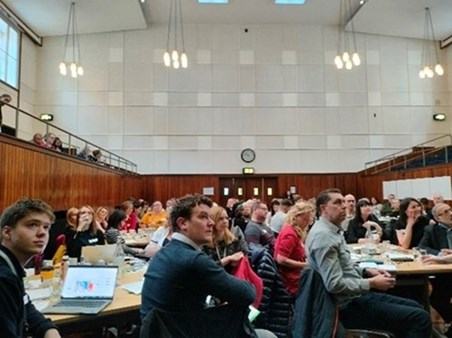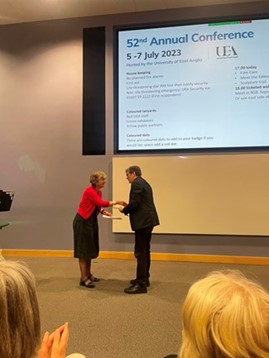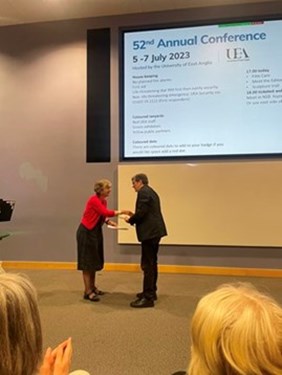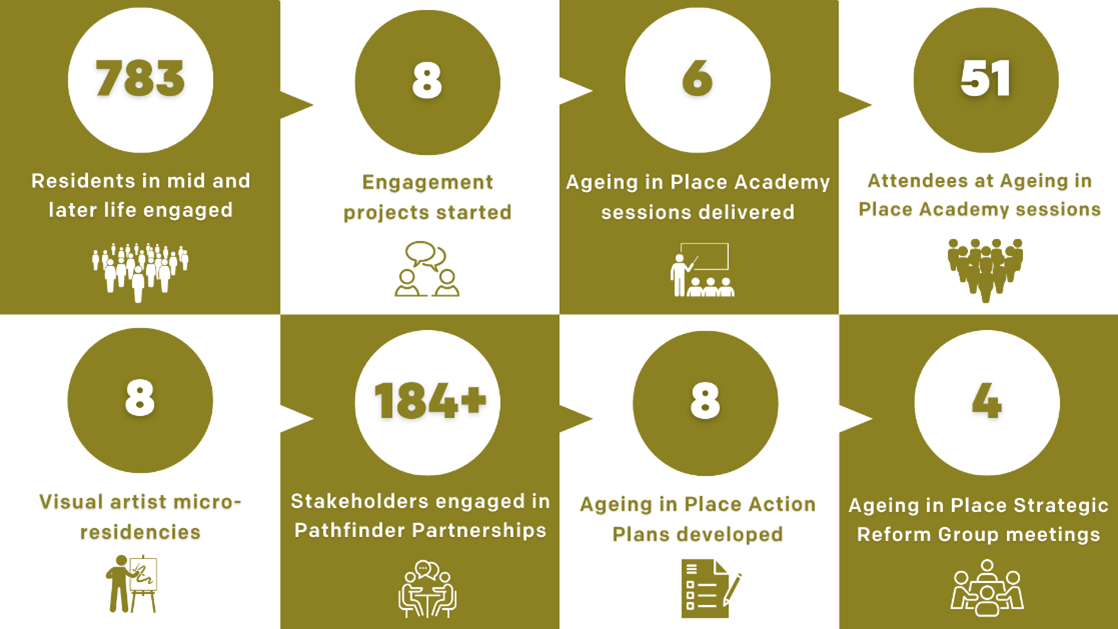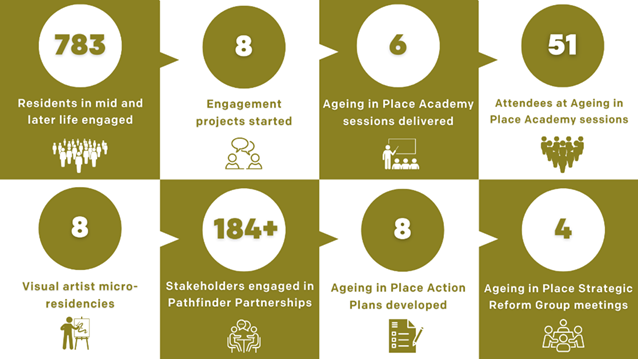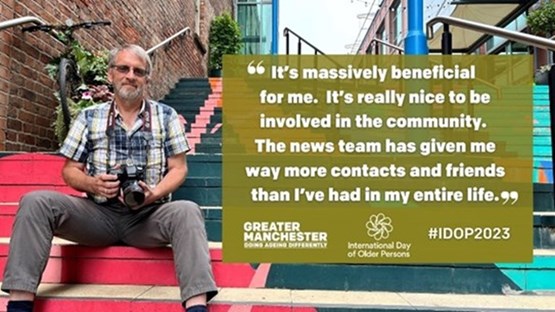
The Ageing Hub Blog
Welcome to the Ageing Hub blog!
The Ageing Hub Blog is a space for the Ageing Hub team to keep you updated on what’s happening in the world of ageing across Greater Manchester, from the Hub itself and beyond. The blog will provide updates on our work every month, as well as inviting guests to share and write about the fantastic activities they are doing in Greater Manchester’s ageing ecosystem.
2023: The year in review (January 2024)
In our first blog of 2024, we are looking back and reflecting on some of the incredible work undertaken by Age-Friendly Greater Manchester over the course of 2023.
The Greater Manchester Falls Collaborative and Falls Prevention Week
In January 2023, the Greater Manchester Ageing Hub, in partnership with key stakeholders from the Greater Manchester Falls Collaborative Strategy group, launched the ‘Greater Manchester Falls Collaborative’ at Friends Meeting House. The event was a huge success with over one hundred delegates from across all sectors, such as the NHS, Public Health and the leisure sector, as well as older people from the communities of Greater Manchester. We also held a 'Greater Manchester Falls Prevention Awareness Week' back in September 2023, showcasing our work across Greater Manchester, along with the latest research on falls prevention and frailty.
The event also kickstarted the co-design of a ‘GM Falls Collaborative system-wide joint action plan’, with the aspiration to adapt this to other elements of ageing well. Due to the hard work of the Collaborative, we are now in a position to accelerate the action plan’s delivery and implementation, whilst reflecting and celebrating what we have already accomplished over the last 12 months. We will be hosting a workshop on Thursday, 29 February 2024 to review what is happening across the system relating to falls prevention and frailty so that we can make sure all our work is joined up and coordinated effectively. Book your place at the workshop (external link).
Doing Digital in Later Life guide animation
In May 2023, Greater Manchester Combined Authority and The Good Things Foundation joined forces to produce a brand-new animated resource – ‘Doing Digital in Later Life: a practical guide’. The guide is designed for anyone from relatives and friends to carers and front-line workers to help them get started and support someone they know to do digital in later life.
The guide was initially launched following Mayor of Greater Manchester, Andy Burnham re-election, where he announced ambitions for Greater Manchester to become one of the first city-regions in the world to equip all over-75s with the skills, connectivity and technology to get online.
This animation reinforces that there’s no one size fits all when it comes to going digital in later life. You don’t need to be a technical whizz to help an older person do things online – being patient and encouraging is what matters most, something we can all do.
The animated video version of the Doing Digital in Later Life guide is another tool our people and organisations across the region can use to support older people in their digital journey. Watch the animation here (external link).
New partnership for Greater Manchester and training sessions on Pension Credit and Attendance Allowance
Also in May, the GM Ageing Hub began a new, exciting partnership with national charity Independent Age. The partnership was agreed to provide support for older people facing financial hardship in Greater Manchester and build capacity of GM organisations supporting older people around financial hardship.
Since then, the partnership has developed innovative new ways of working to support GM’s older residents. For example, throughout last year Independent Age and the Ageing Hub offered short introductory training sessions on Pension Credit and Attendance Allowance to the Greater Manchester workforce. These sessions equip frontline workers with important skills and information on how to talk to older people about two these key income top ups, which can be life changing for those over state pension age. Book onto a future training session (external link).
Paul McGarry wins outstanding achievement award
In July Head of the Ageing Hub, Paul McGarry, won the British Society of Gerontology’s Outstanding Achievement Award for 2023.
The award is the society’s biggest honour and is given to individuals who have made a significant and lasting contribution to gerontological understanding of ageing, or to improving the lives of older people.
Since taking up his role in May 2017, Paul has worked on several projects including the Pension Top Up campaign, which generated more than £3 million of additional income for older residents in Greater Manchester (GM) and the Winterwise campaign, which saw 300,000 booklets of important information and advice delivered to older people across GM.
Greener Later Life
2023 also saw the development of the Ageing Hub's work on climate change and resilience. Throughout 2023 the Hub team and partners, through the ‘Greener Later Life’ workstream, raised awareness and understanding of the impact of climate change on an ageing population as well as the role of residents in mid and later life in championing change.
In August, as part of the Greener Late Life agenda, the Ageing Hub worked with a research partnership led by Heriot Watt University as part of the Healthy Ageing in a Changing Climate project. Workshops were delivered with local residents and Greater Manchester policy makers to inform this work. Members of the Greener Later Life working group demonstrated a participatory community engagement model for encouraging dialogue on climate change to the Mayor's Green Summit in October 2023. Read the final report for the project (external link).
Year 1 Pathfinder
October 2023 marked completion of the first year of the Ageing in Place Pathfinder.
The first year of the Pathfinder represented a significant commitment from a wide range of stakeholders to establish resident-led partnerships in nine neighbourhoods in Greater Manchester. In these partnerships local organisations continue to work together with local residents to agree and prioritise ways to improve the quality of life for residents as they grow older.
Year 1 was extremely successful for the Pathfinder. The Pathfinder areas engaged 783 residents in mid and later life, as well as delivering 6 Ageing in Place Academy sessions with 51 attendees. You can see a full breakdown of data from year 1 of the Pathfinder below.
International Day of Older Persons 2023
Greater Manchester has always been at the forefront of International Day of Older Persons celebrations. Last October, in partnership with Centre for Ageing Better’s UK Network, we chose to celebrate the importance of neighbourhoods for ageing well.
With research showing that individuals aged 75 and over spend at least 80 per cent of their time in their home or the surrounding area, the theme encouraged partners across Greater Manchester to draw on energy around place-making, civic pride, and the contributions of older people in shaping their place. As part of the campaign, we created the hashtag and tagline #KnowOurPlace.
It was amazing to see partners from across the city region engage in a wide range of activities to promote the campaign, with events put on by Age UK, local authorities, care homes and housing providers across Greater Manchester.
2023 was arguably the most ambitious year yet for the Ageing Hub and partners across age-friendly Greater Manchester. Despite challenges such as the cost of living and rises in inflation, age-friendly GM was able to pull together and work hard to make a positive difference to the lives of our older residents.
As we look forward to 2024 there will undoubtedly be a fresh series of challenges and opportunities for partners across the city-region to respond to. However, with many projects on the horizon, including a new 10-year age-friendly strategy for the Ageing Hub, 2024 promises to be even more ambitious and exciting as last year, and we will continue to work to make Greater Manchester a better place to grow older.
International Day of Older Persons 2023 blog (October 2023)
Joe De Paola, Project Officer, GM Ageing Hub
As October draws to a close, we at the Ageing Hub would like to reflect on this year’s International Day of Older Persons campaign.
As most across Age Friendly Greater Manchester already know, 1 October marks International Day of Older Persons (IDOP). For years, Greater Manchester has taken the lead in observing IDOP. We have a firm belief that IDOP helps us to support older people and raise awareness about the challenges ageing populations face.
Indeed, previous iterations of Greater Manchester’s International Day of Older Persons campaigns have been extremely successful. Our ‘This Is What An Activist Looks Like’ campaign, developed with partners and coinciding with the ‘Older and Greener’ IDOP campaign in 2021, garnered national media attention (External website) and continues to be referenced as an example of good practice.
This year, in partnership with Centre for Ageing Better’s UK Network, we chose to celebrate the importance of neighbourhoods for ageing well. With research showing that individuals aged 75 and over spend at least 80 per cent of their time in their home or the surrounding area, the theme encouraged partners across Greater Manchester to draw on energy around place-making, civic pride, and the contributions of older people in shaping their place. As part of the campaign, we created the hashtag and tagline #KnowOurPlace, which was used by partners to help shape their own messages on X/Twitter throughout October.
Below are just a few examples of some of the fantastic activities and information provided by partners to celebrate International Day of Older Persons 2023.
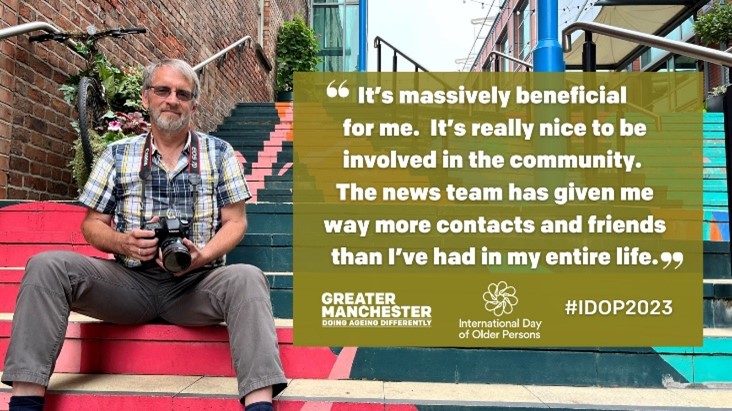
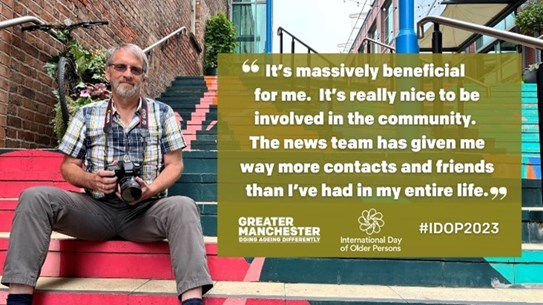
The Greater Manchester Ageing in Place Pathfinder short films
The Greater Manchester Ageing in Place Pathfinder (internal webpage) is working to make sure older people's voices are heard and valued in the places they live.
As part of International Day of Older Persons 2023, we partnered with Yellow Jigsaw (external website) to film local older residents in place. Throughout August and September, we visited each of the nine Ageing in Place Pathfinder neighbourhoods to record films with local residents, highlighting the importance of place for ageing well.
Whether it be connecting with others at social clubs in Worsley Mesnes, Wigan, or supporting the local community at a food pantry in Smallbridge, Rochdale, the videos showcase the neighbourhoods as strong and supportive, and vital for connection, health and wellbeing in later life.
You can find all of the Pathfinder films on the GMCA YouTube channel, under the name 'The Importance of Place' (external website).
Creating Age Friendly Developments guide
Partners from the GM Housing, Planning and Ageing Group, including Manchester Metropolitan University, Southway Housing Trust and Pozzoni Architecture released the ‘Creating Age Friendly Developments’ guide to align with International Day of Older Persons. It is the group’s aspiration that all new homes should be Age-Friendly homes, and that all development plans need to ensure we are creating great places to grow older.
The guide offers a list of ‘Age-Friendly’ considerations that architects, planners and developers should consider when creating new or retrofit urban developments, ensuring that those in Greater Manchester are producing places where everyone can age in place for generations to come.
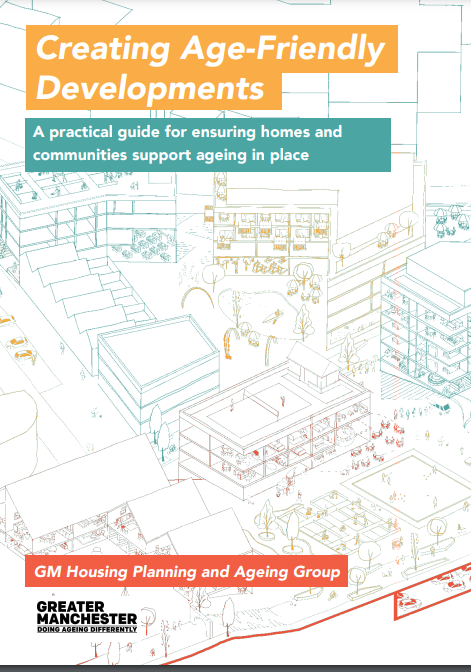
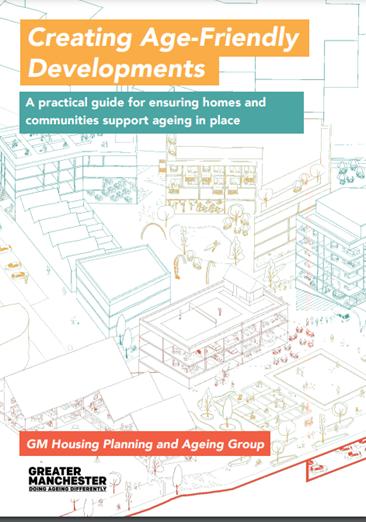
IDOP events across Greater Manchester
Partners went above and beyond to put on a range of fantastic events on Sunday 1st October and throughout October to celebrate IDOP, with events put on by Age UK, local authorities, care homes and housing providers across Greater Manchester. The campaign included calls to action for people working in Age-Friendly GM to promote. A link to those calls is below:
- Join the Age-Friendly Movement - www.greatermanchester-ca.gov.uk/what-we-do/ageing/keep-in-touch/ (internal webpage)
- Become an Age-Friendly Employer: www.greatermanchester-ca.gov.uk/what-we-do/work-and-skills/age-friendly-employer-toolkit/ (internal webpage) and sign up to the Age-Friendly Employer Pledge: ageing-better.org.uk/age-friendly-employer-pledge (external website)
- Join the Greater Manchester Older People’s Network: www.gmopn.org.uk/(external website)
This year’s IDOP theme was particularly pertinent for those of us working to make Greater Manchester the best place to grow older, and we would like to thank all partners for their contributions to mark International Day of Older Persons 2023.
Let’s talk money – making it easier for older people to manage the cost-of-living crisis (September 2023)
Jo Garsden, Programme Manager, Greater Manchester Ageing Hub
In my work around financial hardship, which is supported by national charity Independent Age (external website), I’ve been struck by how few older people are willing to speak openly about their money worries.
This tendency to shy away from talking about financial struggles is not limited to those in later life, but I believe it is unhelpful and only increases the isolation felt by those caught by the current cost-of-living crisis.
A recent YouGov poll commissioned by Independent Age demonstrates both the financial strain on many older people and a resistance to ask for help. The poll found that nationally, 1 in 7 people aged over 65 were reliant on loans and credit cards to make ends meet, with more than half (57%) of respondents also saying they wouldn’t feel comfortable asking friends or family for support.
I see this pattern reflected when I speak with older people about the huge sums of unclaimed Pension Credit in Greater Manchester. The conversation inevitably turns to the stigma, embarrassment, and shame many of their generation feel about claiming benefits. But if we can make talking about money more normal, could we create more safe opportunities for older people in financial crisis to speak up? And could these conversations lead to more of us in later life receiving crucial support and claiming the benefits we are entitled to?
The scale of the opportunity is vast – an estimated £70 million goes unclaimed in Greater Manchester each year, with around 36,000 households eligible but not claiming. Over the past few years, the Ageing Hub has facilitated the Pension Top Up and Winterwise campaigns to help resource councils, housing providers, the voluntary sector, and other organisations. So far, we know at least £10 million per year of additional income has been claimed by older residents in Greater Manchester. Despite the focus on Pension Credit, more income has been generated through take up of Attendance Allowance and Housing Benefit, suggesting that even larger sums of money are going unclaimed.
It's so powerful for decision-makers to hear from older people about their lives, so I am thankful for a new report from Independent Age, ‘Who wants to listen to me? Why England needs a Commissioner for Older People and Ageing (external website)’. Based on a series of listening events across England, including one in Greater Manchester, Independent Age sought to hear from older people about their most pressing issues. Not surprisingly, spirally costs came in the top three alongside transport and ageism.
Importantly for us, the report contains quotes from older people in Greater Manchester, given anonymously, around the impact of the cost-of-living crisis. It’s distressing reading and gives voice to the hidden anguish experienced by too many in our city region:
“I’m making cutbacks, just to survive. Even the things I need, I need to count the pennies.”
“I spent £30 and there’s just nothing in my basket anymore. It’s crazy.”
“Prices are going through the roof. Not by 10p or 20p like we’re used to, it’s £1 or more. The amount in packets is getting smaller too.”
“My bank sent me a letter saying I was overdrawn. And I’ve not been overdrawn since I got my first bank account at the age of 17. I’ve always managed.”
“There are so many older people living in poverty. I know people who have ripped up floorboards to heat their homes, because they can’t afford energy. Costs keep going up and up, and it’s not impacting people equally.”
“I’ve done visits to people in the community before and after COVID, and the change makes me so sad. I was in tears. In our community, there are older people selling furniture and jewellery just to pay rent and cover their bills. We do outreach and try to make little parcels or make the people we support some dinner, but there’s only so much we can do.”
These quotes echo what we’ve been hearing from councils, the voluntary sector and housing providers – rising debt, high levels of fear and stress, older people cutting essential utilities and care support.
As we approach winter, it’s a good time to ask older people we know how they are managing, particularly around energy and food costs. Our talking tips guides (Winterwise Talking Tips guide and Keeping Well This Winter Talking Tips) suggest some simple conversation starters:
- What’s on the menu tonight? How’s your appetite? Has your weekly shop gone up much?
- Are you warm enough at home? Is everything working ok at home? Have you had your boiler serviced? Do you know about warm spaces in your area?
- Have you checked that you are getting all you’re entitled to? Are you getting the best deal on your energy? So much is online now – would you like help to get anything sorted?
It can really help to share our own experiences too. People of all ages have been hit by rising prices. Hearing how we have cut back, saved money, or found great deals can help reduce stigma. If we can normalise and even encourage talking about money pressures, perhaps older people will feel more comfortable asking for support.
The Ageing Hub at the British Society of Gerontology Annual Conference (August 2023)
Every year, the British Society of Gerontology (BSG) brings together a diverse network of academics, students, researchers, policy makers and practitioners at its annual conference to discuss the most pressing issues in the world of gerontology and age-friendly research. The theme of this year's conference, hosted at the University of East Anglia, was: 'Inclusive participation throughout ageing: creating a society for all'.
As the UK's first city-region to join the World Health Organisation's Global Network for Age-friendly Cities, Greater Manchester has a decorated history in creating inclusive, age-friendly environments - and we continue to be at the forefront of this agenda.
In the blog below, Ageing Hub team members discuss their time at the conference and highlight their main takeaways.
Ageing Hub celebrations, Greater Manchester's representation, and an important talk on climate change
Joe De Paola, Project Officer, Greater Manchester Ageing Hub
The BSG conference kicked off with a welcome from the conference chair, Fiona Poland. However, the opening for this year's conference was particularly special for the Ageing Hub and colleagues across Greater Manchester.
During the conference's opening, the BSG Outstanding Achievement Award was also announced. As many working in Age-friendly Greater Manchester will have already seen, this year the award was given to the Head of the GM Ageing Hub, Paul McGarry.
The BSG Outstanding Achievement Award is made annually to an individual who has made a significant and lasting contribution to our gerontological understanding of ageing, or to improving the lives of older people. Paul has been a pioneer in understanding, sharing and promoting age-friendly practice locally, nationally and internationally for three decades, so the award came as no surprise for those of us familiar with Paul and his work.
Still, it was a pleasure to witness the BSG reward Paul for his incredible work and recognise the contribution of others in improving the lives of our older residents across Greater Manchester. Read more about Paul's award.
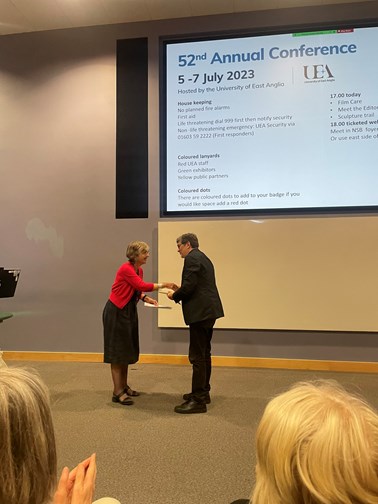
Greater Manchester had excellent representation at the event, with colleagues from the Ageing Hub attending the conference alongside a sizeable delegation from the University of Manchester, and it was amazing to see colleagues leading so many of the conference's sessions, talks and debates.
This included representatives from the Manchester Urban Ageing Research Group who presented their new book ‘Covid-19, Inequalities and Older People’. The book provides a detailed account of the impact of COVID-19 on the everyday life and relationships of older people, together with the organisations working on their behalf. As well as providing a detailed account of the ways that people organised their everyday lives and supported others in their households and neighbourhoods, the analysis shows how the pandemic put a ‘spotlight’ on the precarity and unmet needs of some groups of older adults, such as those living alone, or from ethnic minority backgrounds.
Download the book for free (external website).
Karl Pillemer, Professor of Gerontology at Cornell University, also gave an important session on climate change. Karl explained how the effects of global climate change, such as increases in large-scale drought, incidence of disease, shortages of water and food, rising sea levels, and extreme weather events leave older people amongst the most at-risk groups from global climate change due to decreased mobility, changes in physiology and limited access to resources - all of which may reduce older people's adaptive capacities.
Importantly, Karl also explained how older adults are a crucial yet underutilised resource in the fight against climate change. Due to older adults often having more time for civic engagement, Karl argued older persons could provide a huge number of volunteers for environmental organisations. However, barriers remain to the widespread engagement of older adults in the environmental movement, including a systematic lack of access to environmental volunteer opportunities and ageist attitudes within some environmentalist movements.
The most vulnerable and least protected
Beth Mitchell, Ageing Well Programme Manager, Greater Manchester Ageing Hub
The BSG Conference was a great experience; immersing yourself in the latest research in relation to improving the lives of older people from world leading academics was really insightful.
One session in particular delivered by Dr Aravinda Meera Guntupalli, who is Senior Lecturer in Global Health at the University of Aberdeen, really captured my attention. She looked into ‘The most vulnerable and the least protected: the systemic ignorance of older adults from Low and Middle-Income Countries during the COVID-19 pandemic’. Her findings really echoed what we see across England - systemic ageism and bias across health policy which significantly impacts older people and ignores their needs.
Aravinda also highlighted the need for future health policies (post-pandemic) to focus on participatory policy making, all of which we champion across Greater Manchester, embedding the voice and lived experience in everything we do. It was sad to see that there tends to be systemic ignorance globally in relation to older people, and this is something we must continue to highlight and advocate for the need for change.
Britain’s Forgotten Pensioners: Financial Hardship and Older People (July 2023)
Beth Mitchell, Ageing Well Project Manager, Greater Manchester Ageing Hub
Jo Garsden, Programme Manager, Greater Manchester Ageing Hub
On Wednesday 7th June 2023, Channel 4 aired a documentary looking at the impact of the cost-of-living crisis on older people. The programme followed four older people through the winter months as they were struggling to make ends meet. The programme is really powerful in showcasing the harsh reality of day-to-day life for a large proportion of older people in the UK. Not only does it highlight the significance of not having enough money to make ends meet, but how this is incredibly detrimental to people’s overall physical and mental wellbeing.
The constant worry that is echoed throughout the programme from the case studies we see really echoes what we hear from older people across Greater Manchester. More than two million pensioners are living in poverty in the UK (Poverty in Later Life, Independent Age 2022). Research from Age UK highlights that three-quarters of older people in the UK, equating to 9.4 million people, are worried about the rising cost of living crisis. We know that in Greater Manchester this will be exacerbated by the higher levels of poverty and inequality our communities face.
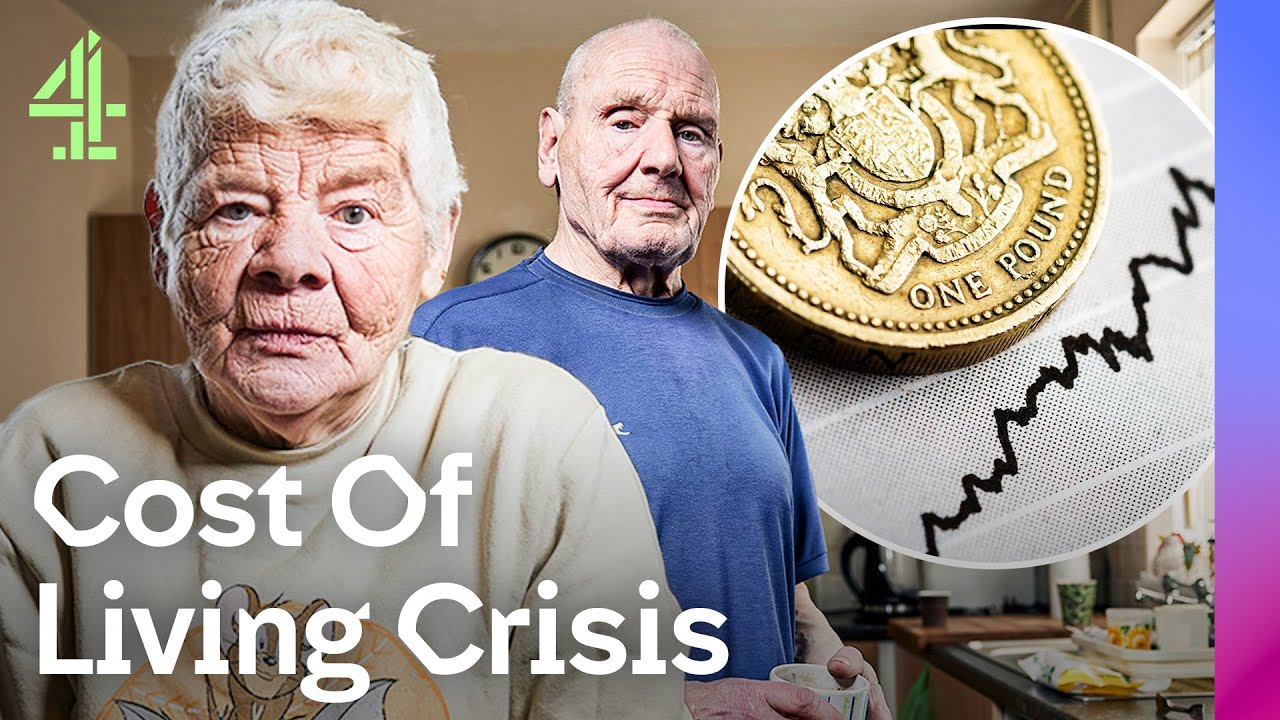
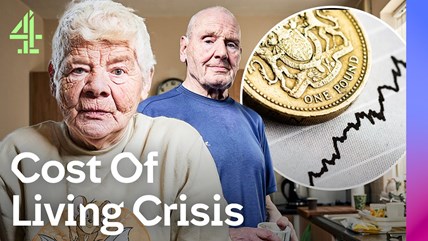
The programme followed the story of John Foster, 76 years of age, who has worked within manual labour all of his life. John has aged without children, or a family to support him. John explains how ‘In the old days, you just used to put your heating on, and you’d forget about it. And now I am worried about the cost all the time.’ John kept his fridge off and lights in the house in the evening to keep his energy use to a minimum. Three in five over 65s say they have had their heating on for less time than usual (YouGov, National Energy Action).
Doreen who is 68 years old, and a retired cleaner old from Tynemouth, explains that she has had two visitors in the last 38 years. Doreen explains that having a low-paid job has reflected in her pension today. Doreen lives off £700 a month, which she explains is manageable for three of the four weeks; Doreen doesn’t have a penny for the final week for food and bills. Doreen explains that ‘The amount of money I get now, is just not enough to live on, it’s just not enough to live a decent enough life.’
How are we responding to this in Greater Manchester?
The Greater Manchester Ageing Hub has sought to ensure a focus on older people within the Greater Manchester response to the increasing financial pressures experienced by so many of our residents. Working closely with national charity Independent Age, we have facilitated two campaigns through our networks - Pension Top Up and Winterwise, both of which focused on increasing benefit uptake - GMCA estimates that around £70M remains unclaimed in Pension Credit across Greater Manchester, with older residents missing out on other entitlements including Attendance Allowance and Housing Benefit.
The voice of older people is central to ensuring an effective responding to the cost-of-living crisis. Drawing on the expertise of the GM Older People’s Network and Older People’s Equality Panel, the Hub has shared details of the day-to-day challenges faced by many older residents and championed the importance of printed materials alongside digital resources.
Independent Age’s ambition is to improve the lives of 1 million older people by 2027 and the national charity are continuing to partner with the Ageing Hub over the next year to improve the lives of older people in financial hardship across Greater Manchester. Activities are being focused on developing and piloting free training around later life entitlements and finances, identifying and sharing good practice, and building capacity in those organisations supporting older residents with financial advice.
We would be really interested in hearing from you if you are working to support older people experiencing financial hardship and are interested in being involved in this work. Please do get in contact with Jo Garsden from the GM Ageing Hub team.
Email: jo.garsden@greatermanchester-ca.gov.uk
The Ageing in Place Pathfinder (June 2023)
Lauren Foster, Ageing In Place Project Manager, Greater Manchester Ageing Hub
The Ageing in Place Pathfinder (AIPP) is a pioneering age-friendly programme led by the Greater Manchester Combined Authority’s Ageing Hub and Manchester School of Architecture (MSA) at Manchester Metropolitan University. Using the World Health Organisation’s Age Friendly Cities model, the programme explores the Naturally Occurring Retirement Communities approach, developed in Canada and North America, which puts the voice of older residents at the heart of its model. The first programme of its kind in the UK, the AIPP is committed to helping adults in mid and later life across Greater Manchester remain independent and engaged within their communities, while also improving their quality of life. By engaging with residents and stakeholders to co-produce action plans, the Pathfinder aims to establish what it is like to live in a local area, how can it be made better and how we can work together.
The programme shares its theme of engagement and co-production with the emerging Greater Manchester Age Friendly Strategy, which builds on the work of the GM Older People’s Network (external website) and Equalities Panel facilitated by MACC (external website). The Strategy is set to be launched in October 2023. The AIPP is also strongly aligned to the Greater Manchester Strategy (external website), the Homelessness Prevention Strategy and the Children and Young People’s Plan in the sense that it values and listens to the voice of lived experience.
As Project Manager of this Ageing in Place (AIP) programme, I can see that this new way of working is both beneficial and essential to place based interventions. Residents are both valued as a voice and contributor, and directly benefiting from the opportunity to raise their concerns and shape the design of intervention. I have witnessed this approach build stronger, more resilient communities as people in mid and later life are empowered to take an active role in shaping their own futures. This approach also allows stakeholders to gain a better understanding of the local environment and work with residents who will be directly affected by changes.
Although many of our lead organisations (a mix of social housing, local authorities, voluntary and social care organisations) are well versed in engagement, this level of co-production is somewhat different. As a result, our core AIPP team, which comprises of the Ageing Hub and MSA, have been working closely with the Pathfinder leads in eight neighbourhoods to develop the programme and understand what meaningful co-production and engagement is. Together, we acknowledge that co-production and engagement are emergent, and that this is a journey; a marathon not a sprint. We have developed the Statement of Co-production on how to engage, listen to and work with older people through local action planning. By working together, we will better our understanding of good practice, build rapport, and establish strong relationships. Discussions have also been held around having the confidence to try new and emerging techniques and methods and subsequently reflecting and sharing what we have learnt with other pathfinders.
Since the launch of the AIPP programme in October 2022, the Pathfinder leads have been spreading the word by engaging with residents, working with partners and building partnerships. These partnership boards are made up of local authorities, service providers, other stakeholders and people over 50 years old living in the neighbourhoods who identify the needs and priorities of their communities. The members will work together to develop shared action plans that meet local needs, and gain assurances over intervention, responsibility and timescales. Each partnership board aims to be 50% resident-led by July 2023 with a view to a co-produced action plan being in place by October 2023. This is an example of co-production in action.
By bringing together communities and partners to co-produce local action plans and developing and implementing strategies to support ageing in place, the AIPP programme is committed to demonstrating the power of co-production in action and creating better futures for older people across Greater Manchester. The programme serves as a model for other communities seeking to address the needs of their ageing population and we will share our learning as the programme advances.
To find out more information on the Pathfinder, including details of the 8 Pathfinder neighbourhoods, please visit our website.
If you would like to be involved in the pathfinder programme or as a stakeholder, please contact ageinginplacepathfinder@greatermanchester-ca.gov.uk.
The Greater Manchester Older People’s Mental Health Network (May 2023)
Sophie Webb, Greater Manchester Older People's Mental Health Network Development Worker
Who are we?
The Greater Manchester Older People’s Mental Health Network is a group of older people aged 50+ who have lived experience of mental health, whether that be first hand or as a carer. We are here not to replace any existing group, but to join up different networks across Greater Manchester, to bolster the voice of older people within service transformation and policy influence.
The network began development in August 2022, and officially launched in March 2023. This was off the back of the Don’t Brush It Under The Carpet self-harm awareness campaign that was co-produced with the Greater Manchester Older People’s Network and their Health & Social Care working group. It was identified that there was a need for a specific focus on older people’s mental health, therefore the idea of creating this network came about.
What do we do?
Our members share their experiences as older people who have accessed mental health support or cared for someone, to influence the transformation of mental health support across Greater Manchester, ensuring that services are age-appropriate and created with lived experience at the core. We do this in various ways such as through storytelling, discussions, and creative workshops including poetry, and encourage our members to link with work that is also happening in their local area. We aim to support and empower people to engage in this work, encouraging them to become lived experience leaders.
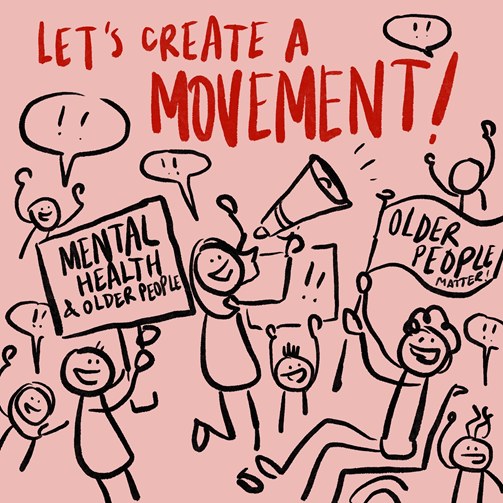
The story so far...
We had our official launch event on March 2nd, 2023, where we had key speakers from the Greater Manchester Integrated Care Partnership (GM ICP), NHS England, and Greater Manchester Ageing Hub. Some of our network members proudly shared their experiences of what drove them to be involved and what their hopes and aspirations are for the network, explaining that they want to create a movement. The launch was attended by those from the VSCE sector, GM ICP, NHS trusts and members of the community, and we had some insightful discussions that helped us to identify some key themes for the network to focus on. These included, raising the profile of older people and removing the stigma around older people’s mental health, more equity, intersectionality and standardisation of services.
Our members have been meeting regularly, starting to create an identity for the group and sharing their experiences and knowledge. We have been undertaking story gathering activities to understand people’s experiences of accessing mental health support, as well as what worked well and what didn’t, and have feed these stories into different areas of the Community Mental Health Transformation and we have had promotion on a national level at an NHS England webinar as well as locally at the Greater Manchester Reform Board. We have also been feeding into the Greater Manchester Older Adults Clinical Reference Group, as well as the new Living Well models across Greater Manchester.
As the network continues to develop and grow, we will continue to recruit members from across Greater Manchester, ensuring we have a diverse membership that is representative of the city region. We will also be continuing to promote the network through various forms such as at events and through videos. We will be starting to engage with projects within the community mental health transformation and are excited to continue ensuring that the voice of older people is included in ensuring support across Greater Manchester is inclusive of older people, and hope that this network becomes a movement!
If you would like to be involved with the Greater Manchester Older People's Mental Health Network, please email GMOPN@macc.org.uk
Additionally, you can find more information on our website: https://www.gmopn.org.uk/ (external website)
Image created by Tom Bailey at the GM OPMHN launch event capturing conversations of the day.
Words by Sophie Webb
Inequalities and Covid-19: Developing a community-based response (March 2023)
Chris Phillipson, Manchester Institute for Collaborative Research into Ageing, University of Manchester
In a televised address on March 23rd 2020, the Prime Minister instructed people to stay in their homes, and avoid meeting friends, as well as family members not living at home. The call was a response to the spread of a deadly infectious disease – SARS-CoV-2 or COVID-19. The pandemic was to have a devastating impact on all areas of life but with inequalities affecting different groups and communities.
Over the period March and December 2020, twice as many years of life were lost in the very poorest areas of the country compared with the wealthiest1. In the case of Greater Manchester, more than a quarter of deaths, in the first wave of the pandemic, were amongst people living in the most deprived areas of the region. Ethnic inequalities were a feature across all waves of the pandemic, with rates of death highest amongst Bangladeshi and Pakistani groups.
Older people suffered hugely from the pandemic – whether in care homes or private households. Just taking the period from January to December 2020, 72,178 people died 60 days after testing positive for COVID-19 or with it mentioned on their death certificate – 67, 451 of whom were 60 and over (42,976, 80 and over)2.
And COVID-19 transmission remains high, with one in 40 people in England infected in the week ending February 28th 2023. Deaths involving COVID-19 are also high amongst older people – 402 people 75 and over in the week ending March 3rd 2023 (out of 499 across all age groups).
Regions such as Greater Manchester took a significant hit from COVID-19, in part of because of the impact of austerity in the decade from 2010. Build Back Fairer: The Marmot Review3 highlighted how mortality rates were higher than they would have been if conditions in deprived neighbourhoods had improved rather than deteriorated in the period to 2020.
But communities in GM also showed greater resilience in the face of COVID-19 – as continues to be the case. Community organisations played a vital role, expanding traditional as well as developing new activities, including meal deliveries, IT assistance, telephone befriending schemes, and bereavement counselling.
Communities have highlighted inequalities arising from the pandemic but also ways of mobilising resistance to those most affected. Greater Manchester, as a World Health Organization Age-Friendly Region, is well-placed to provide continuing support to groups and neighbourhoods vulnerable to COVID-19 and new variants. To achieve this, four areas of work will be essential:
First, local authorities in the region should undertake an assessment of additional resources which may be needed by voluntary organisations given what will be intense pressures to expand the scope of their work – with the cost-of-living crisis adding to COVID-19-related issues. This is especially the case in low-income areas where the pandemic had the most damaging impact. Meetings with representative groups need to be organised to identify gaps in support, and priorities for intervention over the short and medium-term.
Second, mobilising community participation will be vital in the next phase of the pandemic, in particular: supporting those working on a voluntary basis within neighbourhoods; assisting new and existing mutual aid groups; ensuring accessible meeting places – the closure of pubs, libraries and community centres depleting for many localities the social networks which sustain community life.
Third, given pressures on health and social care, community advocates will be needed for those requiring services but lacking anyone who can speak on their behalf. This may be especially important for groups – such as those from minority ethnic communities4 and older adults - who may experience various forms of discrimination in accessing services.
Fourth, the pandemic has highlighted the importance of digital inclusion, with many services going online. This has created problems for those excluded from accessing IT: the evidence suggests that some 1.2 million people across GM might be digitally excluded in some way, with Office for National Statistics data for 2021 showing that 57% of people 75 and over had not used the internet over the past three past three months or had never used the internet. The GM Digital Task Force is a major initiative in this regard, with the ambition to help all under-25s, over-75s and people with a disability to get online.
The impact of COVID-19 can be measured in a variety of ways – quality of life, mortality, and long-term illness. Reflecting these, we know that the pandemic has already accelerated the decline in life expectancy that had started to affect poorer areas in GM over the period 2010-2020. In consequence, developing new public health policies, such as Making Manchester Fairer5, will be necessary to address the deep-seated inequalities which COVID-19 has exposed. Supporting this task must be the knowledge gained working within and getting support from those communities and groups for whom the effects of the pandemic are likely to stretch over many years to come.
Note: An extended discussion of the issues reviewed in this blog may be found in the forthcoming book:Policy Press | COVID-19, Inequality and Older People - Everyday Life during the Pandemic (bristoluniversitypress.co.uk) (External Link)
Footnotes
- Covid impact in poorer areas of England and Wales ‘worse than first thought’ (The Guardian - 15 Feb 2022)(external website)
- COVID-19 confirmed deaths in England (to 31 December 2020): report - GOV.UK (Gov.UK - Updated 3 May 2022)(external website)
- Build Back Fairer: The COVID-19 Marmot Review (External Link - Institute of Health Equity - June 2021) (external website)
- Ethnic Minority Older People, Histories of Structural Racism and the COVID-19 Pandemic PDF (University of Manchester - November 2021) (external website)
- Making Manchester Fairer (Manchester City Council) (external website)
Falls Prevention in Greater Manchester (February 2023)
Beth Mitchell, Ageing Well Programme Manager, Greater Manchester Ageing Hub
Overview
Falls are considered to be a major public health issue, being the second major cause of death and disability after road traffic accidents. They are the largest cause for emergency hospital admissions for older people and are a major precipitant of people moving from their own home to long-term nursing or residential care. What we do know is that in Greater Manchester we are continuing to see much higher rates of falls compared to the rest of the England. Of the ten boroughs in Greater Manchester, six of the areas have recorded higher rates of hospital admissions due to falls than the rest of England2. This is very much the case as to why Greater Manchester prioritises falls prevention across all our settings, inclusive of clinical, care and community settings. We know that falls are not a natural part of ageing and can be prevented; hence why we are incredibly passionate about making prevention an integral part of policy and practice.
What have we done so far?
In January 2022, the Greater Manchester Ageing Hub, in partnership with the Healthy Ageing Research group at the University of Manchester, GreaterSport, and the former Greater Manchester Health and Social Care Partnership (now the NHS Integrated Care Partnership), launched the ‘Greater Manchester Falls Prevention: Delivering Integration and Reconditioning’ report (External Link). Within the report, we committed to establishing a regional Greater Manchester Falls Collaborative which will oversee and deliver the strategic and specific recommendations for falls prevention, integration and reconditioning across community, clinical and care settings.
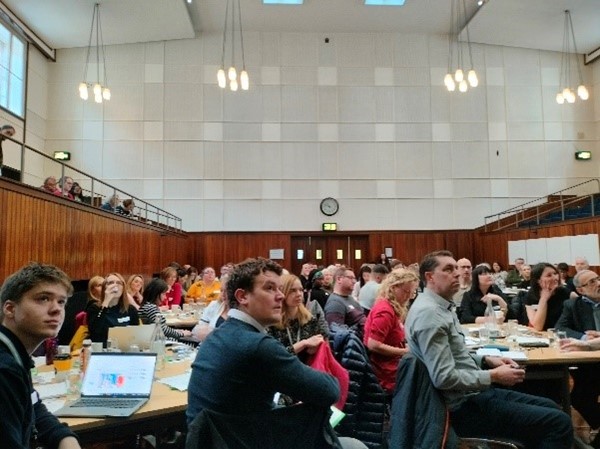
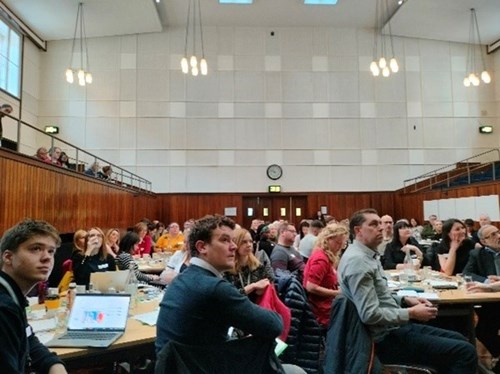
On Monday 23rd January, the Greater Manchester Ageing Hub, in partnership with key stakeholders from the Greater Manchester Falls Collaborative Strategy group, launched the ‘Greater Manchester Falls Collaborative’. The event was incredibly successful, with over one hundred delegates from across all sectors, such as the NHS, Public Health and the leisure sector, plus older people from the communities of Greater Manchester. We have started to develop and are committed to continuing to co-design a ‘Falls Prevention delivery model’ for the system, with the aspiration to adapt this to other elements of ageing well. We are very much looking forward to continuing to progress this over the coming months, with further opportunities to engage.
What will the Greater Manchester Falls collaborative be responsible for?
The overall ambition of the Greater Manchester Falls Collaborative is to ‘improve the health and wellbeing of Greater Manchester residents in preventing falls, improving strength and balance and supporting reconditioning.’ Greater Manchester has a strong history of working in collaboration, across a range of sectors to achieve a common goal. We know from the period of consultation when developing the report that working with all areas of Greater Manchester is the only way that we can achieve an equitable, accessible falls prevention service which meets the needs of our local, diverse communities. There are a number of themes which are a key focus for the collaborative, these include: Equity of access and equality, embedding evidence and evaluating what works, data improvement, insight and interrogation, workforce development, recruiting and training and finally the use of digital technologies that enhance and enable. There was also a strong consensus around the development of a community of learning, to enable the system to share learnings as they emerge, share problems that we are facing as a system, and work to solve issues together.
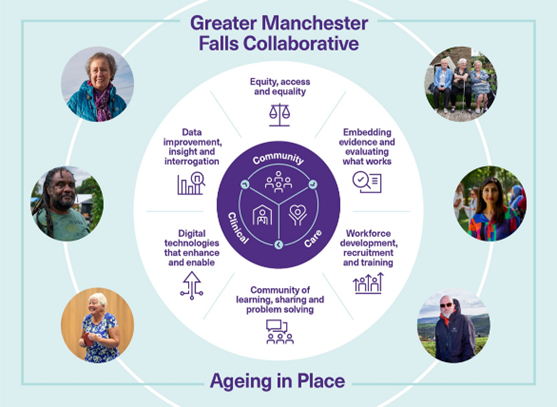
We are very much looking forward to continuing to develop this work over the coming months. We are hosting an online session for those that were unable to attend the above workshop on Thursday the 9th of March from 9:30am-12:15pm (please email Beth Mitchell for more details on how to attend: Bethany.Mitchell@greatermanchester-ca.gov.uk), which will provide another opportunity to influence the development of a system-wide action plan. We also ask that if you are interested in being involved in the work more broadly, helping shape and deliver across the system, then please do get in touch! 😊
2022: The year in review (January 2023)
Joe De Paola, Project Officer, Greater Manchester Ageing Hub
In this month’s blog, we are reflecting on the work which was undertaken by the Ageing Hub and its partners in 2022.
Pension Top Up campaign
May 2022 saw the GM Ageing Hub, in collaboration with Greater Manchester Housing Providers and national charity Independent Age, launch the second phase of the 'Pension Top Up' campaign to encourage greater uptake of benefits and entitlements for older people in Greater Manchester.
Research done by GMCA shows that approximately 36,000 qualifying households are missing out on around £70m in unclaimed Pension Credit. With the cost of living soaring, this is money which could make a real difference to the lives of older people.
The first phase of the Pension Top Up campaign, launched in January 2021 during the pandemic, generated at least £3 million of additional income for older GM residents. The second phase sought to reach even more older people.
The Hub’s partners for the campaign, Independent Age, offered free 1-hour training sessions, which provided a deep dive into Pension Credit and Attendance Allowance. Over 400 frontline workers from across Greater Manchester signed up for the training.
The campaign was featured in the Manchester Evening News, Bolton News and on BBC Radio Manchester. As well as this, the Centre for Ageing Better featured the campaign as an example of good practice in increasing Pension Credit uptake in age-friendly communities (external website).
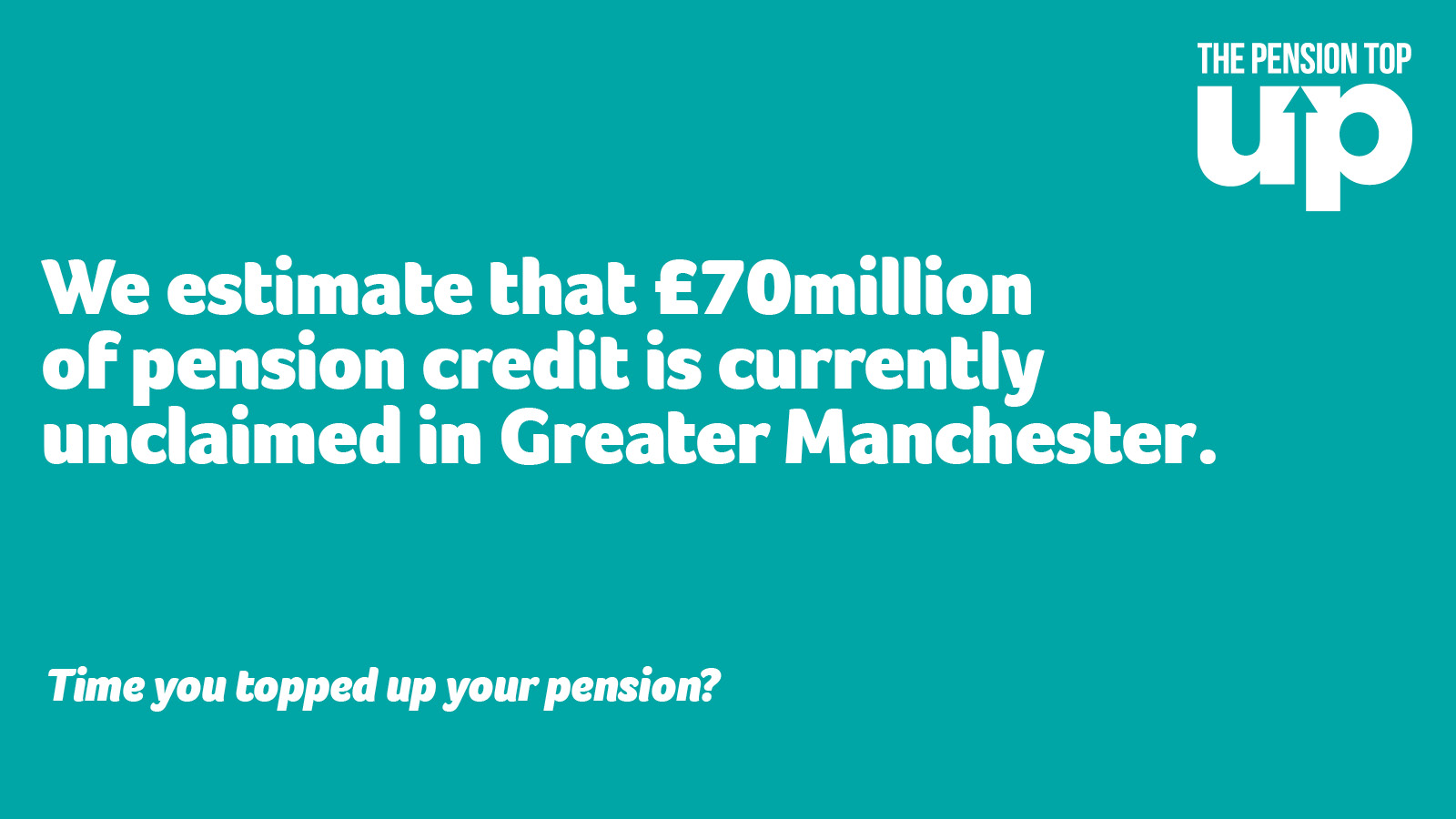
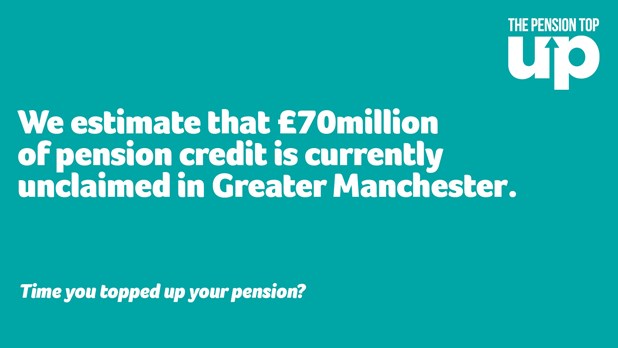
Ageing in Place Pathfinder launch
On 1st October the Ageing Hub launched the Greater Manchester Ageing in Place Pathfinder.
The £4 million Pathfinder is working in eight neighbourhoods in Greater Manchester to test new ways of supporting older people to live well for longer with better health and connections in their local community. In these neighbourhoods older people will lead the way on deciding how best to invest in ways that link their needs as they age to the community in which they live. The Pathfinder recognises that experiences of strong and supportive neighbourhoods are the most important contributor to good wellbeing in later life.
Over the life of the Pathfinder the Ageing Hub’s partners will be ensuring that what we learn locally can support us to expand, sustain and scale the programme so that all places in Greater Manchester are a “great place to grow older”.
Ageing Well in Greater Manchester
On the 18th of October 2022, the Ageing Hub held the first ‘Greater Manchester Ageing Well workshop’. The purpose of the workshop was to share our collaboration with the GM Integrated Care Partnership and bring together the whole system to develop a ‘Greater Manchester Ageing Well Model.’ Our main aims through this work are to create a change in approach to health and social care to ensure we have a more proactive care system in the right place, try to prevent poor outcomes through healthy and active ageing within a place, build on existing community-based age-friendly initiatives; and finally improve the quality of existing acute and community services - ensuring people get the right care when they need it.
As part of the Ageing Well programme, we are also leading on the development and coordination of the ‘Greater Manchester Falls Collaborative.’

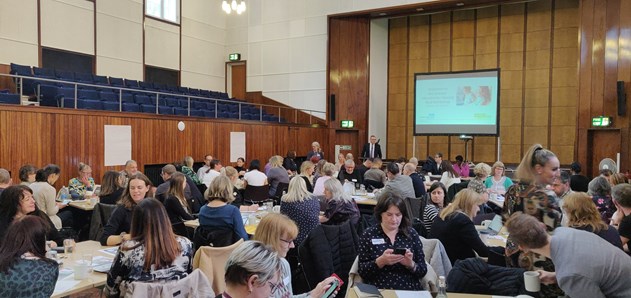
Winterwise campaign
In November the Ageing Hub officially launched the Winterwise campaign, in partnership with Independent Age.
The Winterwise guide brings together key information for older people on cost of living support with messages focusing on three themes - ‘Stay warm’, ‘Stay safe’ and ‘Stay well’. More than 325,000 guides have been printed for the campaign, which continue to be distributed across the city-region. With support from Talking About My Generation – the first older person’s led newsroom in the UK - a video was produced with older residents (external website) in Greater Manchester to promote the guide.
As the costs of energy, food and other bills continue to rise, the Winterwise guide has been offering Greater Manchester’s older residents crucial support over difficult winter months.
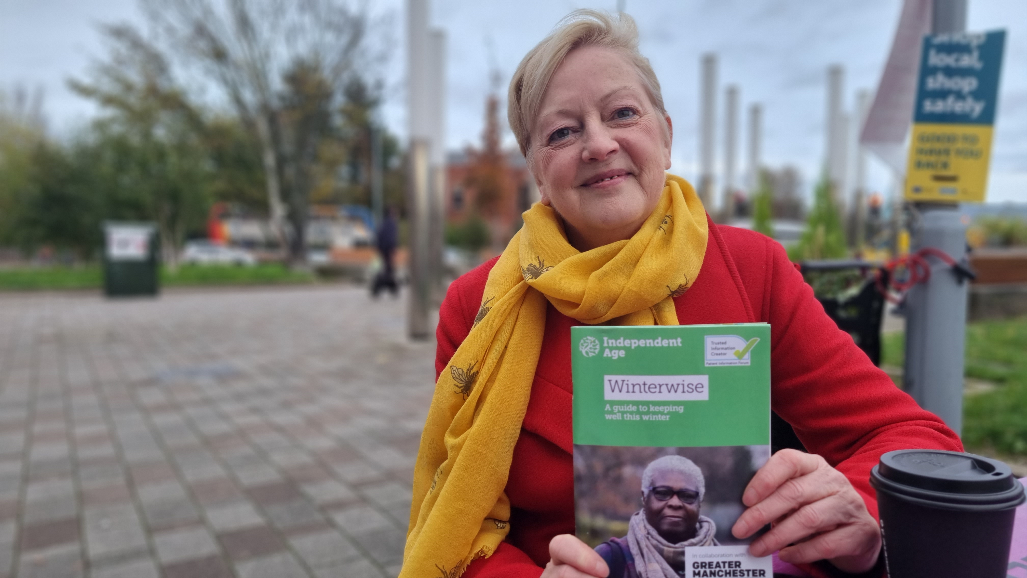
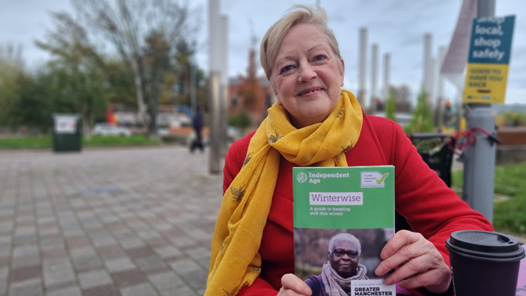
Ageing Hub team growth
Over 2022, the Ageing Hub’s core team also underwent transformation, with the team growing significantly. The Ageing Hub now includes 4 members of staff dedicated to the Ageing In Place Pathfinder Project, an Ageing Well Programme Manager and secondments into the team. In total, the team grew from 3 core members to 10 over the course of the year. We were also delighted to extend our partnership with Centre for Ageing Better, and have recruited a new Strategic Partnership Manager to lead this work
By working together, the Greater Manchester ecosystem made a genuine and positive difference to the lives of older people in GM. As we look forward to 2023, the Ageing Hub will build on these strong partnerships and continue working to make Greater Manchester the UK’s leading age friendly city-region.
Greater Manchester attracts the international community (November 2022)
Joe De Paola, Project Officer, Greater Manchester Ageing Hub
This month, we are looking beyond Greater Manchester’s borders and recognising the significant interest from the international community keen to learn about the work that is going on in the city-region. Working with international partners provides the Ageing Hub, and wider Greater Manchester system, with the opportunity to share best practice, learn from others and promote the city-region as one of the world's leading age friendly communities.
South Korea
Recently, the Ageing Hub welcomed the ‘South Korea Ageing in Place Research Network’ to Greater Manchester. Both the UK and South Korea face major challenges of an ageing population, particularly in supporting inclusive healthy ageing and sustainable health and social care provision. To this end recent policy drivers in the UK and South Korea have focused on place-based ageing through concepts such as ‘Integrated Care Systems’ and ‘Integrated Community Care System’, with a particular emphasis on the role of housing.
The Korean delegation came to Manchester specifically to learn more about the GM Ageing Hub and the history of our work. The delegates had an interest in Greater Manchester’s ecosystem and GM’s cross-sector partnership working approach to issues around ageing. Colleagues from the University of Manchester, Tine Buffel, Professor of Social and Social Gerontology, and Chris Phillipson, Professor of Sociology and Social Gerontology, also presented to the delegation. Tine and Chris brought perspectives from research about ageing in place.
The visit was a great success, and it was agreed that there will be future research collaborations between the South Korea team and Greater Manchester.
Canada
Ageing Hub, Manchester School of Architecture & Greater Manchester Older People’s Network colleagues welcomed visitors from the other side of the globe, too. Michelle Hoar came to Greater Manchester on behalf of the Hey Neighbour Collective, Vancouver (External website) - a project funded by Worwin's Canadian sister organisation the Walton Trust. Knowledge and ideas were exchanged on the role of housing and housing providers in tackling social isolation and loneliness and opportunities for further shared learning and collaboration.
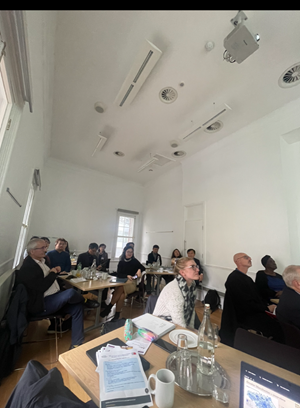
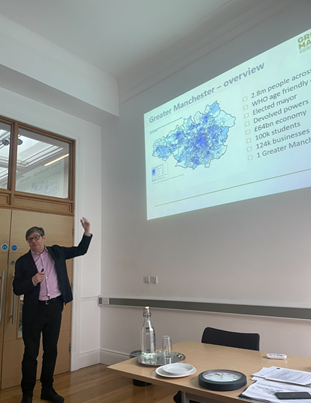
Hong Kong
International speakers have also been welcomed by GM’s wider ageing ecosystem. At one of our weekly ‘wider team’ meetings we were joined by Miu Tsui, a former resident in Hong Kong who is now working for Southway Housing (External website). Miu spoke to the team about her 6-year long experience of working as part of the Age-friendly Programme in Hong Kong (External website). This £20 million city-wide project used a bottom-up, district-based, evidence-based and cross-sectoral collaborative approach to create age friendly platforms in all 18 of Hong Kong’s districts.
Miu spoke about the approaches that were taken by different partners and stakeholders in Hong Kong (including universities, non-governmental organisations, local authority, business sector & public sector and older people) to make the project a success. Activities included assessments, action plans, programmes, training and upskilling of older people, publicity and public education and project evaluation. It was a fascinating introduction to one of the world’s most impressive age friendly projects, and it was noted by the wider team that there were striking similarities in issues, insights and lessons learnt between Hong Kong and Greater Manchester when building an age-friendly city region.
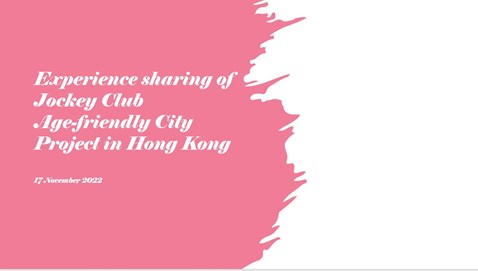
From Bilbao to Tokyo
As well as welcoming guests to the city-region to learn and share best practice, Paul McGarry, Head of the GM Ageing Hub, has been busy presenting to a number of overseas bodies and authorities. In one exciting overseas venture Paul was invited to Bilbao to speak to the Basque regional authority about the dignity of older people in the face of ageism and other forms of exclusion, the creation of emotionally healthy environments against loneliness, technology and rights. Paul also presented, virtually, at the ‘International Forum on the Super Aging Challenge (External website)’ conference in Japan, organised by the Tokyo Stock Exchange and the Financial Times. With a particular interest at the conference in community and the social participation of older people, Paul chose to speak to the Japanese guests about the work of the Greater Manchester Older People’s Network.
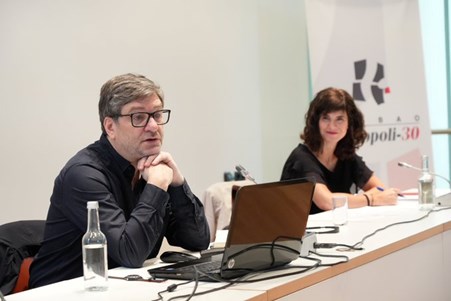
As communities and governments seek to rebuild and plan for an ageing society in a post-pandemic world, it is refreshing that many international policy makers are looking to Greater Manchester for education and inspiration. The widespread interest from the international community in Greater Manchester is a testament to the truly amazing work being done across the city-region by partners throughout the ageing ecosystem, and shows that Greater Manchester is at the forefront of the ageing agenda.
Article Published: 08/11/2022 15:13 PM
